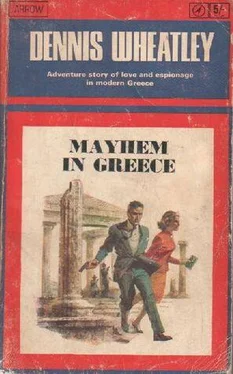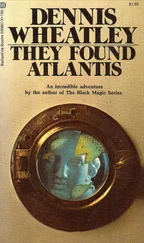'Fear naught!' cried Perseus, or words to that effect, and in a trice he had freed Andromeda by cutting through her chains with Hermes' sword. Turning, he then sprang into the air and rushed upon the monster.
No doubt the gentle reader here expects me to describe a terrible combat, but if the truth be told it was a walkover. For all its foaming jaws and huge swishing tail the giant whale, or whatever it was, did not stand an earthly. Like a tennis ball endowed with perpetual motion, Perseus simply bounced up and down driving his sword into the poor brute's back every time he descended, till the sea was red with its blood and it turned stomach up showing that it was a goner.
When he had done his stuff a mighty cheer broke out. Andromeda's parents and half the population of the countryside had assembled near the shore to see the end of her. The scream she had given on spotting the monster had brought them running to the edge of the cliff, and now they came swarming down it to acclaim our Hero.
As soon as Andromeda had been got ashore and wrapped up in a blanket Perseus told her parents that he wanted to marry her. Just in case they should be against her taking a husband who was not out of the top drawer he added quickly that they would find him in their version of Debrett as a son of Zeus. On hearing this, the King was so delighted that he said Perseus could have the girl and the whole kingdom too if he liked; so everything seemed set fair for the two young people getting to know one another better.
However, it soon transpired that there was a fly in the ointment. Apparently King Cepheus had temporarily forgotten that Andromeda was already engaged to a chap called Phineus. When Phineus heard what was on he became very shirty, and he completely spoilt the wedding feast by turning up at it and demanding his promised bride.
They couldn't very well hustle him out, because they were dressed in their Sunday best whereas he had arrived armed to the teeth and backed by a crowd of armed retainers. What is more, as he was the equivalent of a member of the local Hunt, a lot of the wedding guests took his side against Perseus, who was a stranger.
Perseus, being the sort of chap he was, naturally defied Phineus and refused to give up his girl. For an answer Phineus chucked his spear at him. That started a free-for-all, and for a few minutes it looked as if Perseus and the King's friends, who stuck by him, were going to get the worst of it. But Perseus had taken Medusa's head along with him to his wedding. It must have been a bit high by that time, but I suppose he didn't want to let it out of his sight. Anyhow, with a shout of 'All of you who are on my side shut your eyes,' he pulled the head out of its bag and showed it to the company.
That was that as far as Phineus and his pals were concerned. But it must have been rather a gloomy wedding afterwards, with a crowd of gentry who had just been turned to stone looking on.
Now that Perseus was married he wanted to go home; but Andromeda could not fly, so he had to build a ship to take her. When they reached Seriphos he learned that Polydectes had never let up from chasing his mother—not his own mother, of course, but Danae—round the gooseberry bushes. In fact his behaviour had been so caddish that poor Danae had found it necessary to take sanctuary in Athene's temple.
Straight away Perseus strode up to the castle to give this old wolf-whistler a piece of his mind. But Polydectes got in first. He was very rude to Perseus about his mother not having been married to his father, then he taunted him with coming home with his tail between his legs and no Medusa's head.
That's what you think,' said Perseus, and promptly pulled the head out of the bag. This put paid to Polydectes and no doubt he was removed to decorate the local park. Perseus then made the good Dictys chief of the island and went off to tell his mother, I mean his own mother not Dictys', that she need no longer be afraid to leave the temple.
Apparently she had never let on to him that he was the grandson of the King of Argos, but she told him now; so he decided to go and pay his respects to his grandfather. But before setting out he returned to the gods the wonderful things with which they had equipped him, and he made a present of Medusa's head to Athene. She set the head in the middle of her shield, and you can see it there in most of the statues of her.
Someone tipped King Acrisius off that his grandson was on the way to see him and, recalling the prophecy, the old chap properly got the wind up. Rather than remain in Argos and face Perseus, he fled north to Larissa in Thessaly. When Perseus heard about this he followed him with the intention of assuring him that he bore him no ill-will about his treatment of his mother—oh, bother, I don't mean his own mother but Perseus' mother—and only wanted to say 'Hello!'
When Perseus arrived in Larissa, the King of that place was holding one of those sessions of Public Games which with the Greeks took the place of our Test matches and Cup Finals. As anyone could join in and our Hero rather fancied himself as an athlete he entered his name for all the events. My gentle reader will not be surprised to learn that he took all the prizes one after the other, but when it came to throwing the quoit Fate took ja hand. Not only did his quoit go further than those of any of the other competitors, but a gust of wind gave it a sudden lift, carrying it right into the Royal Box. As a V.I.P. guest his grand-pop had naturally been given a seat there. It hit the wicked old man slap on the head, killing him outright, and thus the Prophecy was fulfilled.
Perseus was very upset about this and, even when he had had himself purified, he still didn't feel happy about taking over the kingdom of Argos, owing to his having come into it by killing bis grandfather. In consequence he swapped it with a neighbour of his for the kingdom of Tiryns. There he built the great city of Mycenae, of which I shall have a lot to tell you later.
By his beautiful Andromeda he had lots of children and they hved happily ever after. The gods were so pleased about this that when they died they were granted immortality, and as bright stars given a place side by side in the heavens.
* * * *
Having finished reading his chapter and put the manuscript away, Robbie went to bed in a more cheerful frame of mind than he had enjoyed for some time. He was pleased with his work and now looking forward to an end to the drudgery he had to endure at the Travel Agency. With his usual optimism and faith in people cleverer than himself, he was by now convinced that Luke would think of some new line of investigation which he could pursue, so that, without suffering the humiliation of having abandoned his quest, he could give Krajcir notice on Monday.
The Greeks being a hardworking people, comparatively few of the shops in Athens close for a half-day, and those that do shut on Wednesdays; so that, although next day was a Saturday, the agency was open for its usual hours. In the morning business was slack, but it became brisker when the office re-opened at four o'clock, as another Czechoslovakian cruise ship had docked that day at the Piraeus.
At about half past five a small group of these tourist-on-a-shoestring were collecting folders and enquiring how, with their very limited funds, they could see something of the night-life of Athens—a diversion not included in their Government-subsidized itinerary. Pani Sebesta had gone out to see a printer about some new stationery that was required, Rudolph and Ludmilla were fully occupied at the counter answering enquiries and Robbie was seated at a small table in the background, engaged in a chore that he had been given of cleaning Pani Sebesta's typewriter.
The bell on the door jangled again, and Robbie glanced up to see a tall, tanned, well-dressed man come in. With an impatient frown at the backs of the little crowd of tourists, the newcomer thrust his way through them and, seeing that both Rudolph and Ludmilla were engaged, called across to Robbie:
Читать дальше












